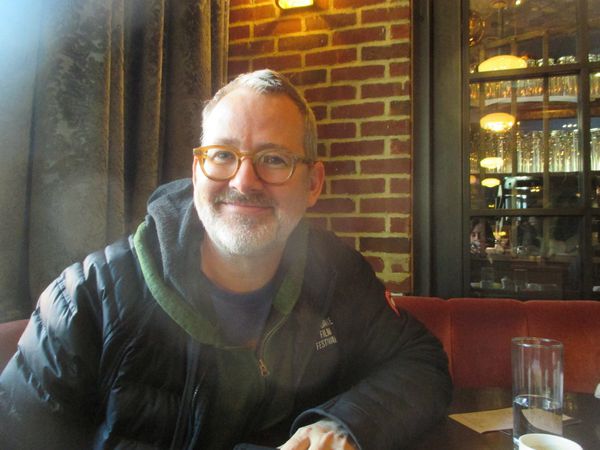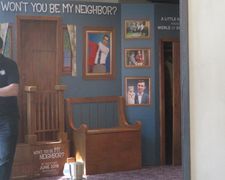One of the biggest oversights in the nominations, announced this morning in Los Angeles by the Academy of Motion Picture Arts and Sciences for the 91st Academy Awards, is Morgan Neville's Fred Rogers' documentary Won't You Be My Neighbor?.
The five feature documentary nominees are Elizabeth Chai Vasarhelyi and Jimmy Chin's Free Solo; RaMell Ross's Hale County This Morning, This Evening; Bing Liu's Minding The Gap; Talal Derki's Of Fathers And Sons (Kinder Des Kalifats), and Julie Cohen and Betsy West's RBG.
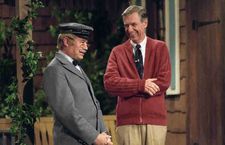 |
| Fred Rogers having a laugh with postman Mr. McFeely (David Newell). |
In 2014, Morgan Neville's 20 Feet From Stardom won the Oscar and on Saturday, he, Caryn Capotosto and Nicholas Ma won the PGA Award for Outstanding Producer of Documentary Theatrical Motion Pictures for Won't You Be My Neighbor?.
When Morgan and I met up in New York less than two weeks ago, we talked about the humanist ideas of Fred Rogers, emotional learning, being in the present, and the title Won't You Be My Neighbor?. He noted that theologian Henri Nouwen was a mentor to Rogers and I brought up Slavoj Žižek's statement on what makes a good neighbour.
Anne-Katrin Titze: The neighbour! What does it mean to be a neighbour? That's part of the question in your title.
Morgan Neville: It's two things. On the one hand, it's a variation of Love Thy Neighbour!, very clearly. But also the neighbourhood is a metaphor for a community in society.
AKT: Which disappears more and more.
MN: It's understanding that we have to nurture our communities. I feel like we're living in this moment where everybody is trying to divide us. It's identity politics, fear-mongering, immigrant speech - that it's all about making us playing one group off against another. There's nobody saying, no, no, we actually have to work on building a neighbourhood. We can't just tear it down for votes and ratings.
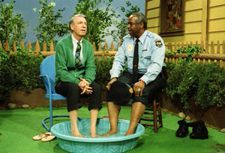 |
| Morgan Neville on the foot washing with Fred Rogers and Officer Clemmons (François Clemmons): "It's like the perfect metaphor for what Fred did too. He did it in such a subtle way. |
AKT: Also, everybody is busy on their little screen.
MN: Isolation.
AKT: Isolated from each other. As in the Fifties advertisers started to get families to no longer eat the same meal together, but offered "choice" in order to sell more of their products.
MN: That's interesting.
AKT: If you get people so separate that no one eats the same food anymore.
MN: Then you can sell more things.
AKT: You can sell more things and from there you can point straight to the obesity crisis. Bigger portions, more packaging. And this is happening with entertainment now too. People don't watch things together anymore. Working on a community seems so far removed from people's daily experience.
MN: The other thing that reminds me of how pleasant that was - I mean now we talk about things like mindfulness. There are apps for mindfulness. But that's what he [Fred Rogers] was doing. Like, how do we just be present here in the moment? Let's not be distracted, let's take time. This kind of patience and listening.
Slow culture is something we talk about now. And he was doing it all 50 years ago before there were words for it. That sense of the power of just being present in the moment we lose. Because we're always somewhere else.
AKT: That's the point.
MN: On a phone - at the dinner table, we're not actually there with each other, even if we're physically near each other. And again, that's just another version of being in a community.
AKT: Slavoj Žižek, years ago, made a connection between Love Thy Neighbour and the idea of tolerance. He develops this via Kierkegaard, perfect Christian love, the dead neighbour and ends up with the conclusion that tolerance often means nothing more than "Don't bother me. If you don't disturb me or come too close, I'm tolerant."
MN: "Good fences make good neighbours" - that axiom? I think it's not that we all have to be best friends with everybody. But we have to have some measure of empathy for other people's plights. It's really what a lot of it is about. The less empathy you have, the more selfishness you have.
I feel like in many ways Fred Rogers was like a documentary filmmaker - that he was all about listening and all about telling stories to build empathy. I mean that's what documentary filmmakers do. It's like we show you other people's lives, trying to get you to identify with how other people live. It's like fundamental to what we do. I think in that way Fred would have been a great documentary filmmaker.
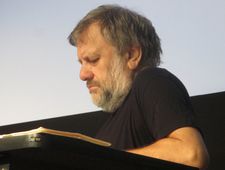 |
| Slavoj Žižek, years ago, made a connection between Love Thy Neighbour and the idea of tolerance. Photo: Anne-Katrin Titze |
The message is not that you'd have to be best friends with everybody, but you have to at least appreciate what other people are going through. If it's not appreciated, it's easy to dismiss it.
AKT: It is always individual people you are dealing with. Look at the foot washing scene you show from Mr. Rogers!
MN: It's like the perfect metaphor for what Fred did too. He did it in such a subtle way. That he could address these political issues in a kids show, in a way that nobody protested. People hardly even noticed.
But it was modelling in this very gentle way how we should treat each other. A lot of what his show was about was these first principles of how to behave as a person. When you're teaching 2 to 6-year olds, they don't know how to be people.
AKT: They don't and he explains.
MN: He is saying, this is how you should treat other people, this is how you should treat yourself. You can love other people. You should have self-love. It's like the most fundamental lessons of what it means to be a human that he's trying to impart to people. It's the emotional learning. Most children's television is about learning how to count or read. He was teaching them about emotions.
AKT: And about values, very much the way classic fairy tales did.
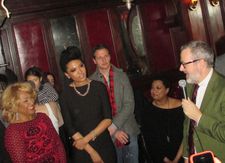 |
| Morgan Neville introducing 20 Feet From Stardom stars Darlene Love, Judith Hill and Lisa Fischer Photo: Anne-Katrin Titze |
MN: Absolutely.
AKT: The scenes at Fred Rogers' funeral near the end of your film show the faces of the kids who were brought there by their parents to protest. The kids look as if they feel miserable!
MN: That is haunting. It is the antithesis of what Fred believed in. They are essentially teaching children hate. When all Fred wanted to do is teach children love.
AKT: At his funeral! And demonstrators brought their kids. You sometimes now see kids being dragged along to rallies by screaming adults.
MN: Yeah, it's like child abuse really. I mean, what happens in a culture where we teach hate to children? There's way too much of that. Fred's whole message was that the responsibility is with us.
AKT: "I like you as you are."
MN: That's accepting our uniqueness. We almost named the film that. No, we almost named the film "'t's You I Like.' That was the working title. Our original title for the film was The Radical Mister Rogers. But I changed it after the election.
AKT: You didn't want 'radical'?
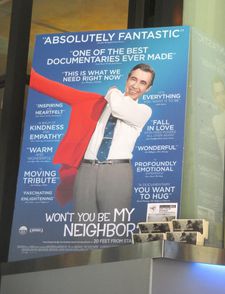 |
| Won't You Be My Neighbor? poster in New York Photo: Anne-Katrin Titze |
MN: I didn't want to give people, conservatives, an excuse not to see the film. Because I felt, more than anybody, they needed to see the film. I made the film very specifically for people I don't agree with. Because the things Fred Rogers talks about shouldn't be controversial. They're common, human ideas I think most people would agree with.
Yet we've become so politicised that many of these basic human ideas of empathy somehow are called liberal ideas. It's absurd to me, because many of them come out of scripture. Or they come out of all religions. They are basic humanist ideas.
AKT: Would you say that there is anything specifically Protestant about Fred Rogers?
MN: No, I mean, in fact one of his real religious mentors was the European Catholic theologian Henri Nouwen who Fred became very close with. He wrote a number of very famous books with kind of a liberal reading of theology. But I think Fred studied religion a great deal and he ended up learning Hebrew and would read the Bible in Hebrew.
But he also studied Judaism and studied Islam and studied Buddhism. He was trying to learn from all the religions. He was not specific to Protestantism. But if you look at the common humanist values in the world's religions, it's a pretty good guide to how we should treat one another.
Read what Morgan Neville had to say on a Fred Rogers commencement address, a speech to US Senator Pastore, and piercing sincerity in Won't You Be My Neighbor?








